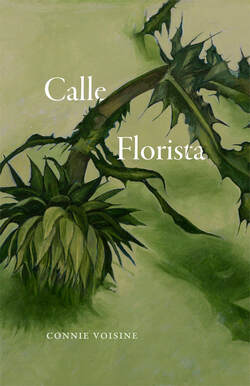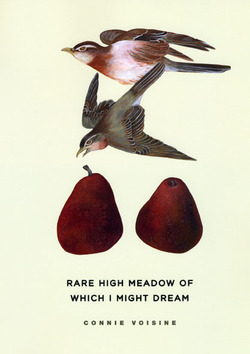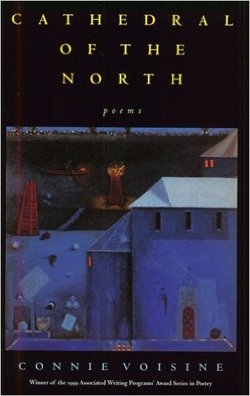
Available from Bull City Press
Connie Voisine's chapbook follows the observations and consolations of a speaker undergoing loss and motherhood in a contemporary, very problematic America. Honesty and humor unite to create an impressive resistance to the threatening forces of crime, alcoholism, poverty, and misogyny. Acknowledging without accepting a world that expects women to exist quietly and complacently, she meets each of its challenges with an approach that is realist without being pessimistic. By exercising her acerbic language and even sharper wit, she resolutely defends her power from a society hell-bent on taking it away.
C. Dale Young, author of The Halo
"It takes a special gift to find within the mundane that which is almost holy. As with most of Voisine’s work, the ordinary (belly fat, horses, medics, and cops) becomes extraordinary. Not pointillist impressions, these poems are hard realities conveyed with oils and cut with a palette knife. This is Voisine’s gift: an imagination that by stringency yields revelation.”

Available from University of Chicago Press
Laura Kasischke, author of The Infinitesimals
"Aristotle said that the greatest thing by far is to be a master of metaphor, and to be one is to be a genius. Voisine is that great thing, and that genius. Nearly every line of every poem is its own poem. She has re-visioned our most looked-at things. She brings us new ways to see, and to be. To travel through the neighborhood of this collection is to be surprised at every corner turned, but to recognize it completely. There is no greater poetic gift, or thrill."
Jacqueline Osherow, author of Whitethorn
"'The next poem I write will be better,' begins the final poem in Connie Voisine's wonderful Calle Florista. This strikes me as quite a hefty promise, since the poems in this volume are already so gratifying and surprising. They carve a marvelous spot for themselves at the crossroads of joy and regret, pathos and humor, faith and doubt, elegance and quirkiness, making the very most, not only of 'the flimsy scraps that more genuinely / compose the day' but also of the very largest concerns: 'Maybe the soul isn’t a fussy eater-- / still, it is ravenous / and expensive.'"
Carol Muske-Dukes, author of Sparrow
"In her haunting new collection Calle Florista, Voisine dances at the edge of nihilism, an imaginative and moral strategy borrowed from George Herbert, whose style of doubt and recovery she celebrates throughout the book. Her poems flirt with ugliness and with nothingness, negating the body, the street, the desert flowers, the natural world itself. Yet an astonishing, powerful affirmative lyric drive wells up: ‘the way a wren /of a word then another gives itself to a sentence.’ These remarkable poems operate like everyday miracles, driving the reader from despair to belief, word by word—into the perfect radiance of profound poetic revelation."

Available from University of Chicago Press
Rare High Meadow of Which I Might Dream is a book haunted by the afterlife of medieval theology and literature yet grounded in distinctly modern quandaries of desire. Connie Voisine’s female speakers reverberate with notes of Marie de France’s tragic heroines, but whereas Marie’s poems are places where women’s longings quickly bloom and die in captivity—in towers and dungeons—Voisine uses narrative to suspend the movement of storytelling. For Voisine, poems are occasions for philosophical wanderings, extended lyrics that revolve around the binding and unbinding of desire, with lonely speakers struggling with the impetus of wanting as well as the necessity of a love affair’s end. With fluency, intelligence, and deeply felt emotional acuity, Rare High Meadow of Which I Might Dream navigates the heady intersection of obsessive love and searing loss.

Available from University of Pittsburgh Press
“Passe la nuit, writes Connie Voisine in Cathedral of the North, her first magical collection of poems. The night passes—in the Acadian French of the tiny town where she grew up, as far North as the country goes) and day comes again, bringing each story closer to its conclusion, each character in the gaze of the book’s clear-eyed, word haunted narrator more precisely alive. What a blessing of language and what a brilliant gift this young poet has been given—to re-see the past, its nights and days, to re-animate the present, to dream it all, night and day, into these startling poems.” --Carol Muske
“Contains the raw, obsessive energy you like to see in a first book, a book that knows its subject intimately, takes it seriously and renders it humanely. It also contains some of the best American poetry I’ve see in a while, often reminiscent of early Forché: the same stark language, the deft use of language and metaphor . . . compelling and urgent, Voisine’s voice deserves to be heard. Cathedral of the Northreaches up with its bells and spires and shapes love and loss into song.” --Dorianne Laux
“Surely only in a virtuoso performance could we have stars ‘tighten to teeth marks on the freezing sky,’ then ‘thick as salt spilled for the trees/ to lick’ and finally a single ‘star, resting on a branch, a ring on its hand.’ They’re especially moving in the service of this exploration of what it means to be among ‘the unbeautiful few who can survive that far north.’” --Jacqueline Osherow
“The luminous details and emotional subtleties in these poems bring to mind Alice Munro’s short stories. They light the dark corners of familiar rooms, but also open onto inner and outer landscapes I feel I’m seeing for the first time. These are visionary poems in every sense of the word.” --Sharon Bryan
“Cathedral of the North succeeds in examining and accepting, with delicate attention, the knot of inherited love and anguish it claims as its own.” --Virginia Quarterly Review
“Voisine’s poetry is wholly unsentimental, tactile, and filled with unexpected beauty....this is a dazzling, brave, and surprising first book.” —Bookshelf